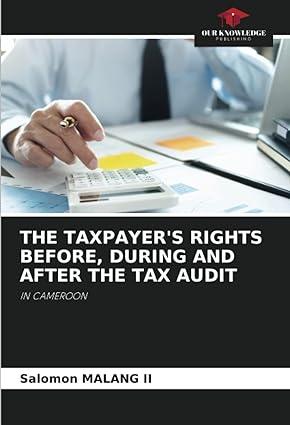Question
1. An investor shall discontinue the use of the equity method when A. The investor ceases to have significant influence over the associate. B. The
1. An investor shall discontinue the use of the equity method when A. The investor ceases to have significant influence over the associate. B. The associate operates under severe long-term restrictions. C. The investor ceases to have control over the associate. D. The business activities of the investor and associate are dissimilar.
2. When an investment ceases to be an associate, the fair value of the investment at the date when it ceases to be an associate A. Is regarded as its cost on initial recognition as a financial asset. B. Is regarded as its fair value on initial recognition as a financial asset. C. Is regarded as its fair value on initial recognition as a financial liability. D. Is regarded as its amortized cost on initial recognition as an investment.
3. On the loss of significant influence, the investor shall recognize in profit or loss any difference between A. The initial carrying amount of any retained investment, any proceeds from sale of the part interest and the carrying amount of the investment at the date when significant influence is lost. B. The fair value of any retained investment and the carrying amount of the investment at the date significant influence is lost. C. Any proceeds from sale of the part interest and the carrying amount of the investment at the date significant influence is lost. D. Any proceeds from sale of the part interest and the carrying amount of the investment sold, and the difference between the fair value and carrying amount of the retained investment.
4.Which statement best describes significant influence? A. The holding of a significant proportion of the share capital in another entity. B. The contractually agreed sharing of control over an economic entity. C. The power to participate in the financial and operating policy decisions of an entity. D. The mutual sharing in the risks and benefits of a combined entity
5. When an entity holds between 20% and 50% of the voting power if an investee A. The investor must use the equity method. B. The investor should use the equity method unless circumstances indicate that it is unable to exercise significant influence over the investee. C. The investor must use the cost method. D. The investor must use the fair value method.
6. Which statement is incorrect concerning the equity method? A. The investment is initially recorded at cost. B. The investment in associate is increased or decreased by the investors share of the profit or loss of the investee after the date of acquisition. C. The investors share of the profit or loss of the investee is recognized in the investors profit or loss. D. Dividends received form the investee are accounted for as dividend income.
Step by Step Solution
There are 3 Steps involved in it
Step: 1

Get Instant Access to Expert-Tailored Solutions
See step-by-step solutions with expert insights and AI powered tools for academic success
Step: 2

Step: 3

Ace Your Homework with AI
Get the answers you need in no time with our AI-driven, step-by-step assistance
Get Started


